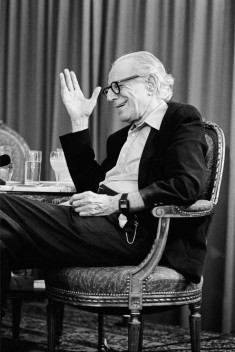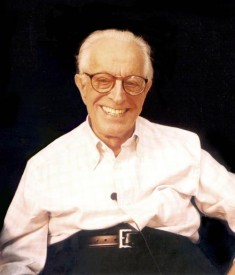| Albert Ellis | |
|---|---|
 |
|
| Psychologist | |
| Born | Sep. 27, 1913 |
| Died | July 24, 2007 |
| Nationality | American |
Albert Ellis was a famous American psychologist. He is best known for developing REBT (Rational Emotional Behavior Therapy) and for being the president of the Albert Ellis Institute in New York for many years. Many people consider Albert the second most influential psychotherapist in history, right after the prominent Carl Rogers. Sigmund Freud was ranked third. Before his death, Psychology Today described Ellis as the greatest living psychologist.
Early Life
Albert was born on September 27, 1913, in Pittsburgh, PA. He was born to a Jewish family. His father was a great businessman and was in most cases away from his home on different business trips. In his autobiography, Albert said that his mother was a self-absorbed lady with bipolar disorder.
Just like his father, Albert’s mother was distant from her kids. As a young man, Albert Ellis took up the duty of taking care of his siblings. In one instance, he even bought an alarm clock using his own money. He used the clock to wake and dress his younger siblings.
At the time of the Great Depression, all the children in the family decided to look for work to help the family financially. At an early age, Albert was hospitalized with kidney disease and it is said that he had eight hospitalizations between the ages of five and seven years old.
As an adolescent, Albert was extremely shy around ladies. At age 19, he started showing signs of thinking like a cognitive-behavioral therapist by forcing himself to talk to about 100 women in the Bronx Botanical Gardens within a period of one month. This helped him get rid of his fear of rejection by women.
University Highlights
Albert joined the field of clinical psychology just after earning his bachelor’s degree in 1934. After this, he started a short career in business and later turned to writing. In 1942, Albert started studying for his Ph.D. at Columbia University. He completed his master’s degree in June of 1943.
Albert Ellis started publishing articles before he even received Ph.D. In 1946, he wrote his critique that widely used pencil & paper personality tests. Albert received his Ph.D. in 1947. During this time, he believed that psychoanalysis was the deepest and the most effective form of therapy.
Albert went to train further in psychoanalysis and then started to practice classical psychoanalysis. After his Ph.D, he started a Jungian analysis and program supervision with his colleague, Richard Hulbeck. He also taught at New York University and Rutgers University.
Contributions to Psychotherapy
Albert Ellis was greatly influenced by works of Alfred Adler, Karen Horney, Erick Fromm and Harry Sullivan. From the late 1940s, Albert worked on REBT and by 1953, his break in psychoanalysis was complete. By this time, he was advocating for more active directive type of the field of psychotherapy.
 In 1955, he presented his idea of RT (Rational Therapy). In RT, therapists sought to help clients understand and act on this understanding. His personal philosophy contained beliefs that contributed to his emotional pain. The new approach basically stressed on working to change client’s self-defeating ideas and beliefs by demonstrating their own irrationality, rigidity, and self-defeatism.
In 1955, he presented his idea of RT (Rational Therapy). In RT, therapists sought to help clients understand and act on this understanding. His personal philosophy contained beliefs that contributed to his emotional pain. The new approach basically stressed on working to change client’s self-defeating ideas and beliefs by demonstrating their own irrationality, rigidity, and self-defeatism.
Albert believed that though rational analysis and cognitive reconstruction, many people could comprehend their self-defeating ideas in light of irrational beliefs and therefore develop much more rational constructs.
In 1954, Albert Ellis started teaching his new techniques to other therapists. By 1957, he formally introduced his cognitive behavior therapy. He proposed that therapists should help a person adjust their thinking together with behavior as a cure for emotional and other behavioral problems. After two years, he published How to Live with a Neurotic. In 1960, he presented his paper on the new approach at the American Psychological Association in Chicago.
Love Researcher
By the 1960s, Albert, together with other researchers, was credited with founding the American sexual revolution. Earlier in his career, he was well known for his work as a sexologist and his controversial opinions on human sexuality. Sex and love were his professional interests since the beginning of his career. In 1952, Albert Ellis published Sex Beliefs and Customs and in 1958, he published Sex Without Guilt. In 1965, he published a book called Homosexuality: Its Causes and Cure.
Later Life and Legacy
Albert’s work extended into other areas other than psychology such as politics, education, business and philosophy. With time, he became a very prominent social commenter and public speaker on many different issues. From 1965 until his later years, he led the famous Friday Night Workshops. Here, he conducted therapy sessions with volunteers from audience.
Ellis died in 2007 following struggles with a variety of health issues, including a bout of pneumonia in 2006. He was an author and co-author of no fewer than 80 books and 1200 articles during his 93 years of life.